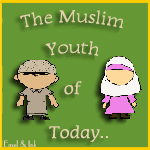Belief and Worship of The One True God is the cornerstone of a Muslim’s belief.
Many religions also claim belief in One God however, they associate partners with Him. The following are examples:
1. Worshipping or asking forgiveness of God through His creation
2. Delegating some of God’s attributes to other objects or beings
3. Setting up rivals with God by elevating something to be in opposition to Him
The above mentioned beliefs or actions all go against the very principles of Islam.
About Allah
Allah is the personal name of the One True God.
The name “Allah” is the combination of two Arabic words, “Al” and “ilah”. “Al” means “The”, and “ilah” means “God”. These two words come together and refer to “The God”, which implies “The Only God”, or “The Only True God”.
Nothing else can be called Allah. The term has no plural or gender. This shows its uniqueness when compared with the word “god” which can be made plural (i.e. gods) or feminine (i.e. goddess). Muslims believe that Allah is:
The One:
1. Allah is one and has no partners at all
2. Allah has no equals or associates
3. Islam rejects characterizing Allah in any human form
4. None of His creation resembles Him
5. There is nothing comparable to Allah
6. No part of Allah is present in anyone (although his knowledge encompasses everything)
The Praiseworthy:
1. No being or object is worthy to be worshipped except Allah
2. Any worship and prayers directed towards (or through) saints, prophets, other human beings or nature is considered idolatry
3. Allah hears all who praise Him
4. Everyone has direct access to Allah
5. Muslims have a direct connection with Allah without the need for any intermediaries [such as idols, saints, angels, priests, planets, Jesus (peace be upon him), animals, graves or statues]
The All-Just:
1. Allah judges everyone based on their own deeds and everyone is accountable for his/her own actions
2. Humans may distinguish themselves and earn Allah's favor through virtue and piety only (not through race or wealth)
The Most High:
1. Allah is over His creation separated from his creatures
2. Allah is high above being compared to anything
The All-Merciful:
1. Allah is incomparably more merciful to His creation than a mother to her baby
2. No one is “born into sin”
3. Allah forgives all sins
The All-Powerful:
1. Allah has no rivals
2. The concept that Allah rested on the 7th day of creation has no basis in Islam
3. Allah has control over everything
4. Obedience to Allah does not increase His Power, and disobedience to Allah does not decrease His Power in any way
5. Not a leaf falls without the permission of Allah
To truly ponder the majesty of Allah makes one humble. This is what Allah calls us to do - to know Him through His attributes and names, realize His Omnipotence and Majesty, call upon Him, and humble ourselves to Him. Allah’s beautiful names and attributes also include:
1. The Creator and Sustainer
2. The Forgiver and Pardoner
3. The Appreciative
4. The All-Knower and All-Aware
5. The One who answers the one in need if he asks Him
6. The One free and far removed from any deficiency
7. The incomparably Great
About the Qur'an
Muslims believe that the Qur’an is the literal word of God (1). Together with the authentic sayings of Prophet Muhammad (peace be upon him), it is the main source of Islamic knowledge. The following are some verses that confirm what has been discussed:
1. “Allah is He, other than Whom there is no other god.” Qur’an 59:22
2. “And worship Allah and associate none with Him.” Qur’an 4:36
3. “So set no equals to Allah while you know (there is none equal to him).” Qur’an 2:22
4. “Say: ‘How do you worship besides Allah something which has no power either to harm or benefit you?" Qur’an 5:76
5. “There is nothing like Him and He hears and sees all things.” Qur’an 42:11
6. “Your Lord says: ‘Call upon Me, I will answer you.” Qur’an 40:60
About Prophet Muhammad (peace be upon him)
Muslims believe that Muhammad (peace be upon him) is the final Prophet in a long chain of Prophets sent to call the people to the obedience and worship of God alone. Some of these Prophets include Adam, Noah, Joseph, Jacob, Abraham, David, Jesus and Moses (peace be upon them all).
Muslims do not worship or ask divine guidance of Muhammad (peace be upon him). He warned: “Do not exceed bounds in praising me as the Christians do in praising Jesus, Son of Mary. I am only the Lord’s servant; then call me the Servant of Allah and His Messenger.”
Just as Muslims believe that Moses (peace be upon him) was sent with the Torah (2) and that Jesus (peace be upon him) was sent with the Gospel (3), Muslims also believe that Muhammad (peace be upon him) was sent with The Qur’an to demonstrate how its teachings should be applied.
Some sayings of the Prophet (peace be upon him) include:
1. “Among the best of you are they who have the best character.”
2. “Allah will not show mercy to him who does not show mercy to others.”
3. “The strong is not the one who overcomes the people by his strength but the strong is the one who controls himself while in anger.”
4. “Look at the person who is below you; and do not look at one who is superior to you. Thereby you would be able to better appreciate the favors that God has bestowed upon you.”
5. “Do not consider even the smallest good deed as insignificant; even meeting your brother with a cheerful face.”
6. “Be humble and do not harm or consider yourself superior to others.”
About Worship
We have established that Islam teaches that only God alone deserves worship. So what is worship?
Muslim scholars have defined “worship” as, “An all-inclusive term for those internal and external sayings and actions of a person that are pleasing to Allah.”
In other words, the concept of worship in Islam is not limited to rituals such as praying, fasting, giving charity, and performing pilgrimage - it is much more.
A person can turn everyday activities into acts of worship by purifying his or her intention and sincerely seeking Allah’s pleasure through these activities. Allah’s Messenger (may the peace and blessings of Allah be upon him) said: “Greeting a person is charity. Acting justly is charity. Helping a man with his horse is charity. A good word is charity. Every step taken on the way to performing prayers is charity. Removing an obstacle from the road is charity.”
Even earning a living can be done for the sake of God if done for the right reasons (e.g. working to support a family). If however one works to show off or earn fame then this can not be considered worship.
The above might sound strange to those who view religion only as a personal relation between the individual and God and as having no impact on those activities that are not connected specifically with any religious rituals. For Muslims however, Islam is not just a religion, but a complete way of life.
-----
1. Any Quranic translation, either in English or any other language, is neither a Qur’an, nor a version of the Qur’an, but rather it is only a translation of the meaning of the Qur’an. The Qur’an exists only in the Arabic in which it was revealed.
2,3. Only the Qur’an has remained unchanged and preserved, while the other original revelations have been lost or corrupted.
Thursday, August 13, 2009
Subscribe to:
Post Comments (Atom)





No comments:
Post a Comment